With three weeks to go before New York City public schools welcome students back for the new school year, U.S. Secretary of Education Miguel Cardona visited PS 89 Cypress Hills Community School on Aug. 16 as part of a tour of the city’s community schools.
The federal official was joined by U.S. Rep. Nydia Velázquez for a tour of the school’s greenhouse and a panel discussion on the state of public schools in the midst of a difficult few years for students and educators.
Federal funding and community schools
Cardona praised the school’s summer programs, noting that President Joe Biden’s American Rescue Plan had included significant funding for such programs.
“Only half of Congress voted for it, but 100% of students benefit — don’t forget that,” Cardona said. “What I saw there [in the greenhouse] was opportunity. I saw community partnerships happening here — creating programs together. You’re on another level here.”

Velázquez recalled the history of the school, which was created in 1997 by local parents, the Cypress Hills Local Development Corporation and New Visions for Public Schools. The dual-language school, which currently serves 430 students from Pre-K through eighth grade, moved into its current building in 2010 after years without a permanent, stable school building.
Community schools are more than just schools — supported by local community organizations, in this case the CHLDC, they serve almost as community centers, offering healthcare, adult education classes, and more.
The congresswoman said in addition to the summer funding passed in the American Rescue Plan, the House of Representatives last spring voted to send billions of dollars in funding to Title 1 schools, community learning centers, grant programs and more.
“We are so lucky to have someone with [Cardona’s] capacity, tradition and skill,” Velázquez said. “We will do everything possible to provide the best quality education. If we are confronted with another pandemic, the infrastructure should be such that we could function.”
‘Not just resources’
But, during a panel discussion, parents said money isn’t enough. New York City’s public schools have struggled to deal with the coronavirus pandemic — many students and teachers left the city altogether, and those who remain have been left to deal with inconsistent policies, low school budgets, and long stretches of time out of school.

“We want to see the federal government not just send resources, but we want more transparency with parents,” said Benjamin Greene, a public school parent and member of Community Education Council 13. “A lot of the time, we see resources come down into NYC, and we have no say over them, and then when it fails, they blame the parents.”
Lilah Mejiah, a parent and member of Manhatttan’s Community Education Council 1, said parents were not adequately informed about what was going on in public schools during the pandemic. Many students struggled with internet issues at home, she said, and when winter came once schools were back in session, the best teachers could do to keep air circulating was to keep the classroom windows open.
“School communities started shrinking during the pandemic. Over 1,000 students left, and we don’t know what happened to them,” said Camille Casaratti, president of CEC 15 in Brooklyn. “But it gave teachers an opportunity to think about different learning models that had not been used widely because unfortunately it did not work with higher numbers of students.”
The small class sizes may have been short-lived. Many schools are expecting to slash the number of teachers they employ after the city reduced public school funding this year, and Greene said good teachers are being priced out of the city.
“We can’t talk about schools without talking about housing,” he said. “We are losing out a lot of our good educators because they cannot afford to live in the city. A lot of parents are also moving out because they cannot afford housing.”

Teachers who live in the community are better able to understand their students and the community, Greene said. He suggested — with approval from the crowd — that the government bring back 70s-era programs like subsidized housing for educators.
“We keep hearing about teacher shortages,” Cardona said. “We could have predicted this. We haven’t respected our teachers.”
Kellyanne Griffith, a parent at MS 50, a community school in Williamsburg, emphasized the importance of compassion in schools — both for students and staff.
“We need loving teachers — you have to have compassion for every person that is set before you,” Griffith said. “In order for them to pour into our kids, they need someone to pour into them also.”


























